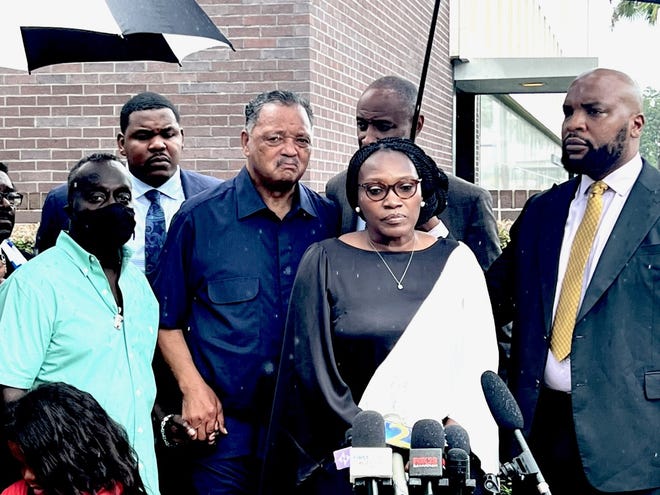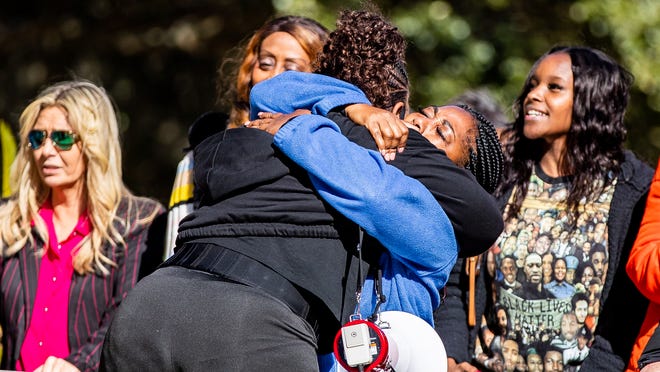SAVANNAH, Ga. — The three men serving life in prison for Ahmaud Arbery’s murder were again handed lengthy prison sentences Monday on federal hate crime charges.
Travis McMichael, who fatally shot Arbery, will serve his federal sentence of life plus 10 years. His father, Gregory, who initiated the deadly pursuit of the jogger, will serve life prison plus seven years. Their neighbor William “Roddie” Bryan, who took a video of the killing, was sentenced to 35 years in prison.
They will serve the federal sentences concurrently with the state time. The judge denied each man’s request Monday to serve his sentences in federal prison.
In February, a jury found that the three men, who are white, violated Arbery’s civil rights and targeted him because of his race. Arbery was Black.
Although the men are already serving life sentences, the additional punishments mark “an important moment for the Civil Rights Section of the Department of Justice and an important moment for the federal judiciary,” said Ayesha Bell Hardaway, an associate professor at Case Western Reserve University School of Law and co-director of the school’s Social Justice Institute.
“It is a rejection of our nation’s ugly history when public lynchings were celebrated with family picnics,” she said.
HISTORIC CASE:What the hate crime verdicts in Arbery’s death say about justice and race in America
AFTER ARBERY KILLING: District attorney and shooter’s dad had 16 phone calls
U.S. Attorney General Merrick Garland said “protecting civil rights and combatting white supremacist violence” is part of the DOJ’s founding purpose.
“The Justice Department’s prosecution of this case and the court’s sentences today make clear that hate crimes have no place in our country, and that the Department will be unrelenting in our efforts to hold accountable those who perpetrate them,” Garland said in a statement.
Arbery, 25, was killed Feb. 23, 2020, after the McMichaels grabbed guns and jumped in a truck to chase him after he ran past their home outside Brunswick. Bryan, 52, joined the chase in his own truck, helped block Arbery’s escape and recorded cellphone video of Travis McMichael shooting Arbery at close range as the men struggled.
Prosecutors in the federal trial, which lasted a week, included evidence they said showed the men killed Arbery out of racial animus, such as racial slurs and repeated racist characterization of Black people who committed alleged crimes. Defense attorneys argued the McMichaels and Bryan pursued Arbery not because of his race but because of an earnest – though erroneous – suspicion that he had committed crimes in their neighborhood.
The McMichaels and Bryan were found guilty of one count each of interference with rights and attempted kidnapping in February. The McMichaels were convicted of one count of using, carrying and brandishing – and firing, in Travis’ case – a gun during and in relation to a crime of violence.
Arbery’s killing helped fuel a nationwide racial reckoning over the killings of unarmed Black people, including George Floyd in Minneapolis and Breonna Taylor in Kentucky, two cases that also resulted in federal charges.
Monday, several members of Arbery’s family asked the judge to impose the maximum sentence and insisted all three men serve time in state prison.
Though the sentencing hearings signal the end of the lengthy legal process for Arbery’s killers, his mother, Wanda Cooper-Jones, noted that former Glynn County District Attorney Jackie Johnson still awaits trial on charges of violating her oath of office and hindering a police investigation. Prosecutors allege Johnson used her position to protect McMichael and his son.
Cooper-Jones said she’d like to see consequences for Waycross Judicial Circuit District Attorney George Barnhill, who initially claimed the McMichaels and Bryan acted in self defense.
“The journey is not over, we still have more to do,” she said at a news conference after the McMichaels’ sentencing.
BREONNA TAYLOR CASE:Feds charge four Louisville police officers in shooting
Hate crime sentences not just symbolic
Experts said the federal convictions in Arbery’s death are not just symbolic — they ensure the defendants will serve prison time even if their murder convictions are overturned on appeal.
Unlike the state murder charges, federal hate crime convictions acknowledge the racist motivations of what many called a modern-day lynching, experts said.
“It was worth it to name this as a white-supremacy-inspired murder and not to whitewash this by deemphasizing the racist motive here,” said Justin Hansford, executive director of the Thurgood Marshall Civil Rights Center at Howard University. “It’s important as a community that we name what is happening as part and parcel of white supremacy.”
Although hate crimes reports have risen in recent years, the offenses are rarely prosecuted. Just two people were convicted of federal hate crimes in Georgia from 2005 to 2019, according to the Bureau of Justice Statistics. Georgia did not have hate crime legislation until after Arbery’s death.
Defendants asked for leniency
In November, the three men were convicted of murder in a state trial. The McMichaels were denied any chance of parole in their life sentences.
All three defendants remained jailed in coastal Glynn County in the custody of U.S. marshals while awaiting sentencing after their federal convictions in January. Each was denied appeals in the federal hate crimes trial, according to an online court filing.
Travis McMichael’s attorney Amy Copeland asked Monday for her client to be placed in federal custody before he served time in state prison because of death threats he received. “I am concerned my client faces a backdoor death penalty,” she said.
McMichael, 36, declined to address the court.
Gregory McMichael’s attorney also asked for leniency in his sentencing and that he serve part of the sentences in federal prison, citing state facility conditions. A.J. Balbo expressed concerns about his client’s health and argued his sentencing shouldn’t exceed that of Derek Chauvin, the Minneapolis police officer convicted of killing George Floyd. Chauvin was sentenced to 21 years in prison.
Gregory McMichael, 66, spoke publicly for the time in court. He apologized to his wife and son and addressed the Arbery family’s grief.
“I’m sure my words mean very little to you, but I want to assure you, I never wanted any of this to happen,” he said. “There was no malice in my heart or my son’s heart that day.”
Bryan’s attorney J. Pete Theodocion tried to distance his client from the McMichaels in court Monday noting he did not leave his house armed. He requested that Bryan be sentenced to less than a life sentence for his involvement.
Before his sentencing, Bryan briefly apologized to the Arbery family.
“I finally have the chance to say to Mr. Arbery’s family and friends how sorry I am for what happened to him on that day,” he said. “I never intended any harm to him.”
During back-to-back hearings, members of Arbery’s family asked the judge to impose the maximum sentence and have the McMichaels serve their sentences in Georgia state prison rather than in a federal penitentiary.
“How can you dare ask for mercy? You didn’t give my Quez mercy,” Marcus Arbery said, referring to his son by his middle name, during Travis McMichael’s sentencing.
U.S. District Court Judge Lisa Godbey Wood denied the defendants request, citing a rule that typically requires defendants to serve their sentence in the jurisdiction where they were first arrested, tried and convicted.
MORE:Ahmaud Arbery’s killers request acquittal of federal hate crimes convictions
OPINION:Finding my family’s history in Brunswick, Georgia, where Ahmaud Arbery was murdered
‘SO MUCH HATRED’:Jury foreman speaks about men found guilty of murdering Ahmaud Arbery
Contributing: The Associated Press
Raisa reports for the Savannah Morning News. Contact her at rhabersham@gannett.com. Contact breaking news reporter N’dea Yancey-Bragg at nyanceybra@gannett.com or follow her on Twitter @NdeaYanceyBragg



